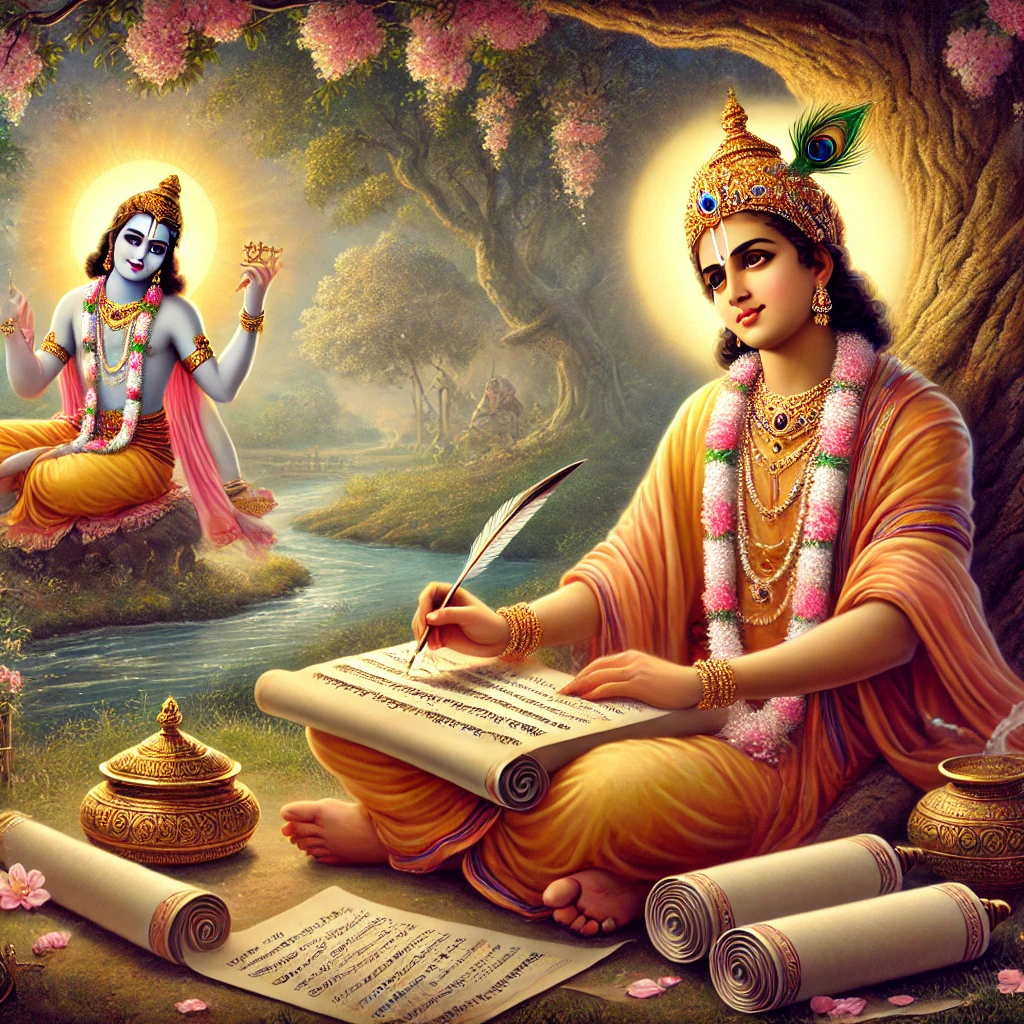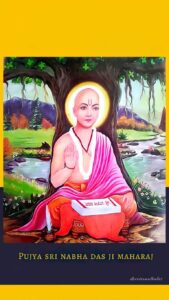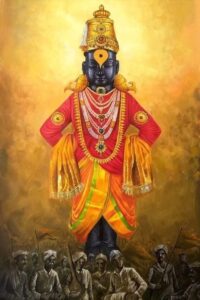Early Life and Background
Sri Jayadeva Gosvami appeared in the village of Kendubilvagram in the district of Birhum during the 11th century. His father’s name was Bhojadeva, and his mother’s name was Bama Devi. Little is known about his early life, but it is said that he was a scholar of Sanskrit from a young age and was inclined towards spiritual life. His contemporaries have described him as “the incarnation of melody.” Sri Jayadeva is most famous as the great poet of Gita-Govinda. Sri Caitanya Mahaprabhu especially relished hearing Gita-Govinda, as well as the works of Candidas, Vidyapati, Ramananda Raya, and the Krishna-karnamrita by Bilvamangala Thakura. Gita-Govinda is filled with the intimate pastimes of Sri Sri Radha-Govinda and is meant for those who have acquired sufficient spiritual piety.
“For those who relish the remembrance of the pastimes of Sri Hari and are always anxious to hear those transcendental divine narrations, these verses, sweet as honey, have been composed by Jayadeva with the blessings of Mother Saraswati.”
Journey to Jagannatha Puri
As a young man, Jayadeva traveled to Jagannatha Puri after visiting many holy places. There, he married a devoted girl named Padmavati, who was dedicated to the Deity of Lord Jagannatha. Jayadeva also developed a deep love for the Lord. Inspired by the beauty of Puri and Lord Jagannatha, he composed Gita-Govinda, which quickly became the joy of the Vaisnava community. At that time, Gajapati Purusottamadeva was the provincial king. He was envious of Jayadeva and posed an ill-fated challenge. Considering himself a master poet on par with Jayadeva, the king composed a work called Abhinava Gita-Govinda.
The Test of Lord Jagannatha
One day, the king summoned his advisors and asked them to widely circulate his work, hoping it would surpass Jayadeva’s. However, even his own men ridiculed this attempt, comparing it to trying to compete with the sun using a mere lamp. The king was relentless, and a controversy soon arose. The brahmanas decided that both manuscripts would be placed before the Deity of Lord Jagannatha overnight, and by morning, the Lord would make His decision. When the devotees arrived the next day, they found Jayadeva’s Gita-Govinda clasped against the Deity’s chest, while the king’s manuscript lay scattered on the floor. The decision was clear.
Service as Chief Pandita
During his time as the chief pandita of Raja Laksman Sena, Jayadeva resided in Navadvipa on the banks of the Ganga. He had three close friends, Sri Umapatidhar, Acharya Sri Govardhan, and Kavi Ksamapati, who are mentioned in Gita-Govinda. Laksmana Sena, aware of Jayadeva’s exalted status as a Vaisnava, went to request him to become his minister and serve as the royal pandita for the entire kingdom. However, when the king arrived at Jayadeva’s residence with his ministers, Jayadeva was displeased. He believed that the presence of the king, a worldly figure, had polluted his home. In his anger, Jayadeva decided to leave Navadvipa.
The King’s Humility
The king, realizing his mistake, offered his obeisances to Jayadeva and humbly pleaded, “Please do not leave my kingdom. I meant no offense. It is true that as a king, I am involved in many undesirable activities, but if you leave, it will be a great loss for everyone. We need the blessings of Vaisnavas, and I only came to request your guidance for the upliftment of the entire kingdom.” Seeing the king’s humility, Jayadeva softened and agreed to stay, but he moved across the Ganga to avoid further intrusion. He allowed the king to visit him, but only in the simple attire of a Vaisnava brahmana, without any display of royal power.
The Miracle of Lord Krishna
While composing Gita-Govinda, Jayadeva became lost in thought while writing about a particular pastime in which Radha repents after Krishna leaves her. He could not decide whether to write a specific verse about Krishna becoming the servant of His devotee. Leaving his work, he went to take a bath. During his absence, Lord Krishna Himself appeared in the form of Jayadeva, wrote the verse in golden letters, and took a meal prepared by Padmavati. When Jayadeva returned, he was astonished to see Padmavati eating before him, which was against tradition. She explained that he had already taken a meal and gone to his room.
Jayadeva went to his room and found the verse written in golden letters, the very verse he had hesitated to write. With tears in his eyes, he called out to his wife, “Padmavati! You are so fortunate to have had darshan of the Supreme Lord!” Moved by this divine incident, Jayadeva’s devotion deepened.
Lord Krishna’s Revelation
Later, Lokasvana Sena, a devotee king, built a hut made of leaves for Jayadeva at Campahati. Lord Krishna appeared to Jayadeva and his wife in that place, taking on the golden complexion of the campa trees growing there. He revealed His form as Lord Caitanya and told them that He would soon appear in Navadvipa to perform congregational chanting, take sannyasa, and then go to Puri to relish Gita-Govinda. He instructed Jayadeva and Padmavati to also go to Puri.
Bhaktivinoda Thakura’s Comment
Bhaktivinoda Thakura has commented that even though Sri Gauranga Deva had not yet revealed Himself, His divine presence was evident in the lives of devotees like Jayadeva Gosvami, who were blessed with the Lord’s vision and guidance.
Lessons to Be Learned from the Life of Sri Jayadeva Gosvami:
- Humility and Devotion: Jayadeva Gosvami’s life teaches us the importance of humility and devotion. Despite being a great scholar and poet, he remained humble and devoted to the Lord. His deep devotion is what allowed him to receive the divine blessings of Lord Krishna.
- Faith in Divine Will: When confronted with challenges, such as the rivalry with the king, Jayadeva displayed unwavering faith in the Lord’s will. He did not get involved in egoistic competition but left the decision to Lord Jagannatha, who clearly showed His preference.
- Selfless Service: Jayadeva’s service to his guru, the Vaisnava community, and ultimately to Lord Krishna was without any selfish motives. His dedication to writing Gita-Govinda was purely for the pleasure of the Lord and the upliftment of devotees.
- Forgiveness and Compassion: Even when the king intruded into his residence, Jayadeva showed compassion and forgiveness after witnessing the king’s humility. This teaches us to look beyond people’s mistakes and recognize genuine repentance.
- Dependence on the Lord: Jayadeva’s hesitation in writing about Krishna becoming the servant of His devotee shows his deep respect and cautiousness in describing divine pastimes. Lord Krishna’s intervention to complete the verse Himself demonstrates that when we surrender to the Lord, He guides us in our spiritual endeavors.
- The Power of Kirtan and Congregational Chanting: Jayadeva’s connection with Lord Caitanya, who later spread the movement of congregational chanting, highlights the transformative power of kirtan. Jayadeva’s works became an inspiration for the Sankirtana movement, showing us the importance of glorifying the Lord through song and poetry.
Prayer: O Supreme Lord, grant me the humility and devotion exemplified by Sri Jayadeva Gosvami. May I learn to let go of my pride and serve You selflessly, just as Jayadeva did. Help me to remain steadfast in my faith, even in times of challenge, and guide me in my spiritual journey. May I always glorify Your pastimes with sincerity and love, and may my life be an offering at Your lo



